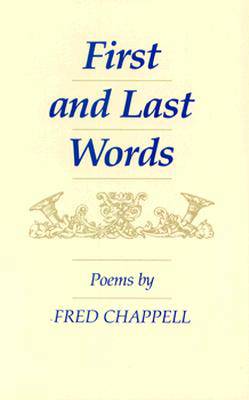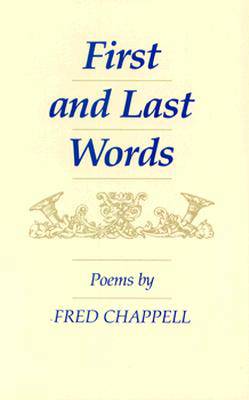
- Retrait gratuit dans votre magasin Club
- 7.000.000 titres dans notre catalogue
- Payer en toute sécurité
- Toujours un magasin près de chez vous
- Retrait gratuit dans votre magasin Club
- 7.000.0000 titres dans notre catalogue
- Payer en toute sécurité
- Toujours un magasin près de chez vous
Description
Fred Chappell continues to astonish. In his new collection of verse, he matches the vitality and grace, the deep intelligence and keenly observant sensibility, that characterize such earlier works as Midquest and Source. First and Last Words revives the traditional practice of supplying new prologue and epilogue poems to classic works of literature. The poems invite renewed acquaintance with familiar works and authors--The Georgics and The Dynasts, Livy and Lucretius, Goethe and Tolstoy, The Wind in the Willows--and are offered as a celebration of their enduring significance. In "The Watchman," a prologue to the Orteseia, Chappell writes:
The watchman keeps his vigil on the roofOf the ruining house. This long year,
Stretched out on his belly like a hound,
He has awaited the semaphore
Blaze, awaited proof
Of the victory that shall pull down
A proud and bitter family. In rain
Or cold starshine, gripping the eave,
He has searched the hard horizon for a sign. Still other poems are appreciations of music or the visual arts, as in "My Hand Placed on a Rubens Drawing" The ages work toward mastery
Of a single gesture. A torso's twist,
The revelation of a thigh,
White stone corded in a fist: Fragments that might still add up
To compose a figure of the perfected soul
As it releases from the grip
Of vision that burned to draw it whole. All of the poems in First and Last Words are marked by a thoughtful use of the voice and a careful attention to language. They confirm Fred Chappell's status as one of our very finest living poets.
Spécifications
Parties prenantes
- Auteur(s) :
- Editeur:
Contenu
- Nombre de pages :
- 64
- Langue:
- Anglais
Caractéristiques
- EAN:
- 9780807114872
- Date de parution :
- 01-02-89
- Format:
- Livre broché
- Format numérique:
- Trade paperback (VS)
- Dimensions :
- 144 mm x 230 mm
- Poids :
- 99 g

Les avis
Nous publions uniquement les avis qui respectent les conditions requises. Consultez nos conditions pour les avis.






